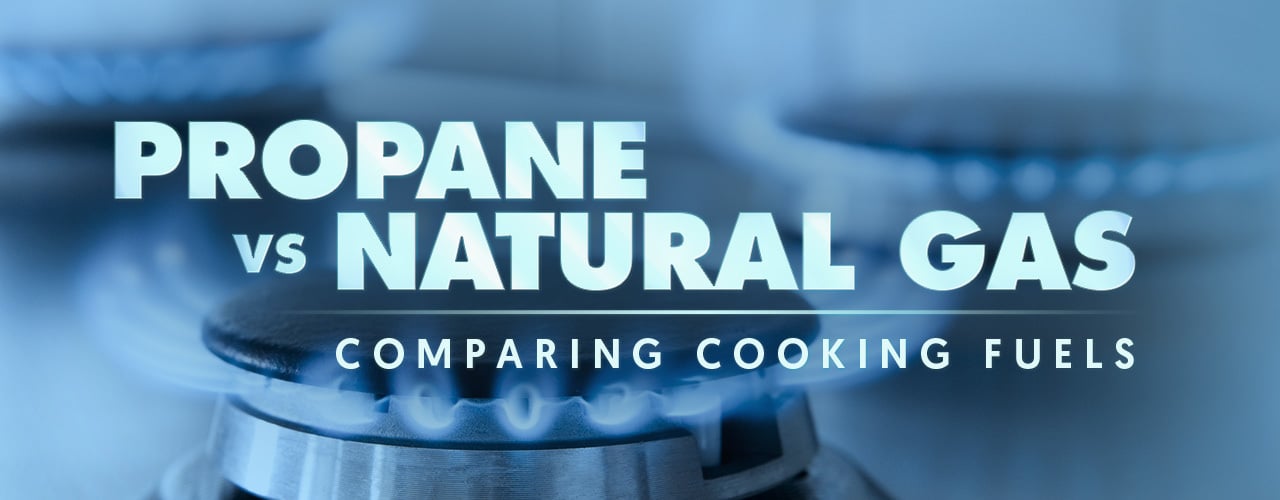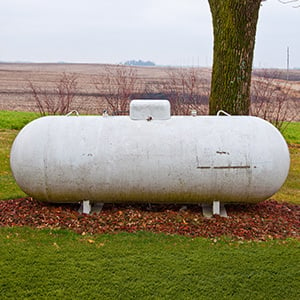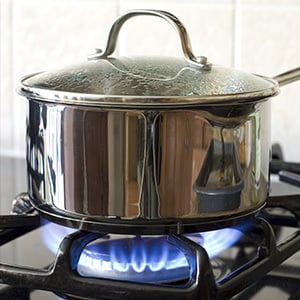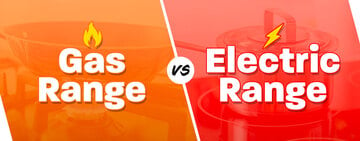
Propane vs. Natural Gas: Comparing Cooking Fuels
Last updated on Oct 9, 2024Whether you manage a restaurant, cafe, or food truck, gas-powered cooking equipment is frequently used in foodservice operations. Gas burners generate significantly more heat than electric burners, allowing for faster cooking times and greater efficiency in the kitchen. The two main types of gas used in commercial settings are propane and natural gas. We’ll introduce both types and what sets them apart below.
What Is Natural Gas?

Natural gas is a fossil fuel extracted from the ground. It is primarily composed of methane, a colorless and odorless gas, but it also contains carbon dioxide, nitrogen, helium, and other trace elements. Natural gas is classified as a non-renewable resource, meaning it will not replenish at the same rate it is consumed. Despite this, it is considered a cleaner alternative to other fossil fuels. While not necessarily an environmentally friendly option, natural gas does burn cleaner than both coal and oil.
Pros and Cons of Natural Gas
If you're deciding whether or not to use natural gas in your restaurant, there are several factors that you should take into account. Continue reading to learn about the pros and cons of using natural gas in a commercial setting.
Advantages of Natural Gas
The advantages of using natural gas in your establishment include the following:
- Less expensive: Compared to other fossil fuels like oil or coal, natural gas is generally less expensive. This cost-effectiveness can translate into significant savings for businesses, especially those with high energy demands.
- Reliable: Unlike renewable energy sources such as solar or wind power, which are subject to weather conditions, natural gas can be relied upon 24/7. This consistency in supply ensures uninterrupted operation for businesses, reducing the risk of downtime and maintaining productivity.
- Easy to transport: It can be transported through pipelines, making it readily available for businesses located near gas distribution networks.
Disadvantages of Natural Gas
Common disadvantages associated with using natural gas are listed below:
- Non-renewable: One of the primary disadvantages of natural gas is that it is a non-renewable resource.
- Highly flammable: Natural gas is highly flammable, making it potentially dangerous if not handled properly. While it is generally safe for use when proper precautions are taken, any mishandling or accidents can lead to fires or explosions.
- Costly pipelines: Natural gas extraction and distribution require an extensive network of pipelines, which can be costly to build and maintain.
What Is Propane?
Propane is a concentrated, high-output fuel extracted from crude oil and petroleum gas during refinement. It is a versatile energy source that can be stored under pressure in small cylinders or bulk tanks. It also burns cleaner than other fossil fuels, producing fewer greenhouse gas emissions. You can refill propane at grocery stores and other commercial establishments or have it delivered, eliminating the need to rely on dedicated pipeline infrastructure. High-volume operations can arrange delivery systems with bulk suppliers, ensuring a steady supply. Propane's portability makes it ideal for remote locations where access to natural gas pipelines may be limited or nonexistent.
Pros and Cons of Propane
Many variables can affect whether your foodservice establishment should use propane. We'll take a closer look at the advantages and disadvantages of using it in a commercial setting below.
Advantages of Propane
Common advantages of using propane include the following:
- Portable: Propane can be easily transported and stored in portable tanks. This flexibility allows businesses to use propane in remote locations or on the go, making it an ideal choice for catering services, food trucks, and outdoor events.
- Versatile: Propane can power a wide range of commercial appliances and equipment, including grills, fryers, ovens, heaters, and generators. This flexibility makes it suitable for various industries, such as hospitality, construction, agriculture, and manufacturing.
- Fewer emissions: Propane offers a cleaner-burning alternative compared to other fossil fuels. When burned, propane produces significantly fewer emissions than coal, oil, and gasoline. This lower carbon footprint makes propane a greener choice for businesses looking to minimize their environmental impact.
Disadvantages of Propane
We’ve listed the disadvantages associated with using propane below:
- Logistics: Transporting propane to and from your location can be a logistical hassle. You need to ensure that you have enough propane on hand to meet your needs, and scheduling deliveries can be time-consuming.
- High cost: The price of propane can fluctuate depending on various factors such as supply and demand, weather conditions, and market trends. This can make it difficult to budget for fuel expenses, especially for businesses that rely heavily on propane for their operations.
- Safety concerns: Propane is highly flammable, which means that extra precautions need to be taken to ensure safe handling, storage, and usage. Businesses that use propane must comply with strict safety regulations and invest in proper training for employees to minimize the risk of accidents or injuries.
Difference between Propane and Natural Gas

Though propane and natural gas serve similar functions, several factors set them apart. We'll investigate some of the most important differences between them below.
- Efficiency: Because propane has a higher BTU rating than natural gas, propane tends to heat faster and use less fuel when compared to the same task performed with natural gas.
- Cost: While prices can vary by region, it is generally true that natural gas is a more affordable option for businesses. However, propane and natural gas are more affordable and efficient than other fuel sources, especially electricity.
- Environmental impact: Though propane and natural gas are both recognized as clean-burning gasses, propane is the more environmentally friendly of the two. It produces significantly fewer greenhouse gas emissions compared to other fossil fuels.
- Installation: Installing a natural gas pipeline can be a significant investment. While the initial cost of installing a pipeline is higher compared to setting up a propane tank, it offers long-term convenience and eliminates the need for regular refills or deliveries. Propane does not require installation in the same way. Tanks are delivered to your location and placed above or below ground, depending on your preference and local regulations.
- Safety: Propane and natural gas are colorless and odorless, and manufacturers add chemicals to make them easier to detect by smell and promote restaurant safety. One crucial safety consideration in the event of a leak is density. Propane is heavier than air, meaning that it concentrates at floor levels. On the other hand, natural gas is lighter than air, causing it to rise. As a result, natural gas leaks will tend to rise to the ceiling, reducing the risk of ignition at ground level.
What Is the Cost of Propane vs. Natural Gas?
Propane is typically more expensive than natural gas, but it's important to note that the same amount of propane can produce nearly twice as much heat as natural gas. It also offers a higher heat output, making it an efficient choice for businesses that require substantial heating or cooking.
Natural gas is the most economical option for commercial businesses. It goes through fewer refinement procedures than propane, resulting in a lower overall cost. Natural gas is often readily available through a utility provider, reducing transportation and storage costs. Switching to either option can help reduce overhead costs in your restaurant.
Propane and Natural Gas FAQ
If you are unfamiliar with natural gas and propane, there can be much to learn. We’ll answer commonly asked questions about propane and natural gas below.
Does Propane Expire?
Unlike other fuels, propane does not deteriorate with time and can be stored for an extended period without worrying about its effectiveness diminishing. It's important to note that the propane tanks used to store the fuel do have a lifespan. According to industry standards, propane tanks should be inspected every 10 years. This inspection is crucial to detect any signs of wear and tear, such as rust or corrosion, and to ensure that the tank is still in optimal condition for use.
Does Natural Gas Expire?
Natural gas has an indefinite shelf life and will not expire. Due to its gaseous nature, natural gas cannot be stored in the same way as other fuels. Natural gas is delivered directly to businesses through pipelines, eliminating the need for on-site storage.
How is Natural Gas Measured?
Commercial and industrial natural gas prices are typically measured in dollars per one thousand cubic feet, or mcf.
How is Propane Measured?
Commercial and industrial propane prices are typically measured in dollars per gallon.
Natural gas and propane are powerful and efficient energy sources. By learning what sets them apart, you can make informed purchasing decisions and save money for your business.





